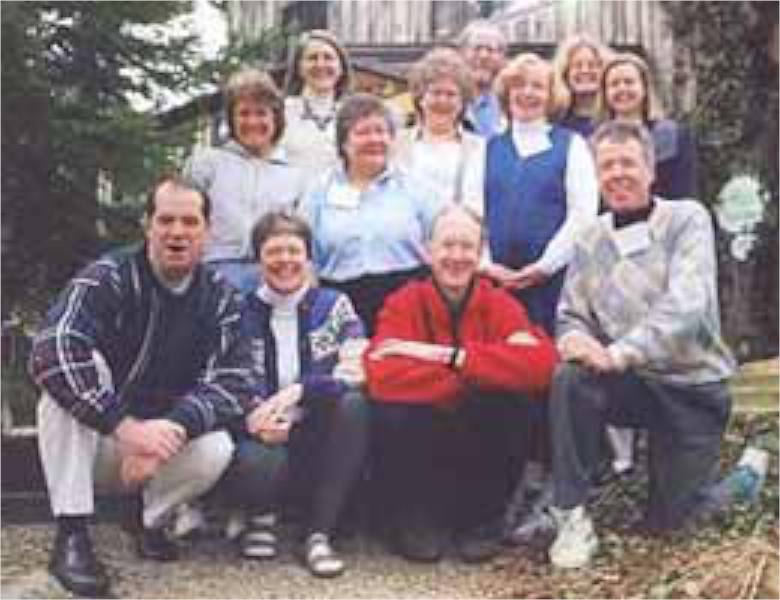Cleaning out the files on my laptop, I came across an old low-resolution photo from 1999, showing a dozen people posing for the camera. It was a photo of the participants in the first “Essex Conversations” colloquium. Using GIMP, I increased the size of the photo to see if I could recognize those people…

I think I can identify most of them. From left to right are Lena Breen, then head of the religious education department of the Unitarian Universalist Association (UUA); Ginger Luke, minister of religious education; Jeanellen Ryan, leadership development director in the UUA’s religious education department; Frances Manly, minister of religious education; Tom Yondorf, parish minister; Susan Davison Archer, minister of religious education; Susan Suchocki Brown, parish minister; and Susan Harlow, professor of religious education at Meadville/Lombard.
In the front row at left is John Marsh, parish minister; a woman whom I’m sure I know but whose name I can’t remember; me, then a lay director of religious education; and Tom Owen-Towle, parish minister.
Several things struck me when I looked at this photo. Everyone is white. At 38 years old, I was the youngest person in the photo. And today, I’m the only one still active and working in a Unitarian Universalist congregation or organization (see the notes at the end of this post).
After looking at the photo, I dug out the essay I presented at that colloquium in 1999. It holds up surprisingly well in a number of areas, especially in its critique of the limitations of developmentalism, and in its insistence on talking about real live learners — I thought then, and think now, that too much theorizing about religious education is done without having real live children and teens in mind.
But it’s also fun to re-read that old essay to find all the things I no longer agree with. First, and perhaps most importantly, my essay didn’t adequately address how it is that learning and individual development depend on social interaction (I read Vygotsky a couple of years after I wrote it). Second, the world has changed a great deal since 1999, and Unitarian Universalist religious education faces new challenges, especially the ongoing decline of religious education enrollment in UU congregations, and the rise of religious disaffiliation, two linked trends that have been accelerated by the COVID pandemic. Third, over the past decade I’ve become increasingly aware of just how religiously illiterate most North Americans are, and I’ve seen research showing how religious literacy improves cross-cultural understanding, and how improved cross-cultural understanding can reduce violence and conflict in our communities; I wish now I’d made religious literacy integral to the essay. Finally, I’m less critical of schooling than I used to be, since I now believe some of the favored alternatives to schooling promoted in UU circle are artifacts of upper middle class white culture; yet because most children in North America attend school, schooling is can be more easily accepted across racial, cultural, and ethnic boundaries.
A revised version of my 1999 essay was published in the book Essex Conversations: Visions for Lifespan Religious Education (Skinner House: Boston, 2001); a book which, somewhat to my astonishment, is still in print. I think it’s past time for another generation of UU religious educators to write new essays about the future of religious education. Unfortunately, a colloquium like the one I attended costs a lot of money, and I suspect the declining financial health of the entire denomination means there won’t be another one in the foreseeable future. And religious education is no longer the priority it once was for Unitarian Universalists, partly because religious education enrollment has been declining since 2005 — but also because the current generation of children is majority non-white, and any attempt to encourage a bunch of non-white youngsters to come into our 95% white denomination is going to run smack up against the systemic racism that pervades the UUA.
Nevertheless, I wish we could put together a group of thoughtful people who are dedicated to religious education, who could spend a long weekend together to talk about what’s needed in religious education for the current generation of children. I wish we could have a new book of essays that address today’s religious education challenges — essays that address how we might keep Unitarian Universalist religious education from completely dying out.
Notes about the people in the photo:
John Marsh died in June. According to the UUA directory of professional religious leaders, Lena Breen, Ginger Luke, Jeanellen Ryan, Frances Manly, Susan Davison Archer, Susan Suchocki Brown, and Tom Owen-Towle are all either retired or no longer active. Susan Harlow, who was a United Church of Christ (UCC) minister, is retired from People’s Church in Chicago. Tom Yondorf left the ministry in 2000 to become a school teacher.
